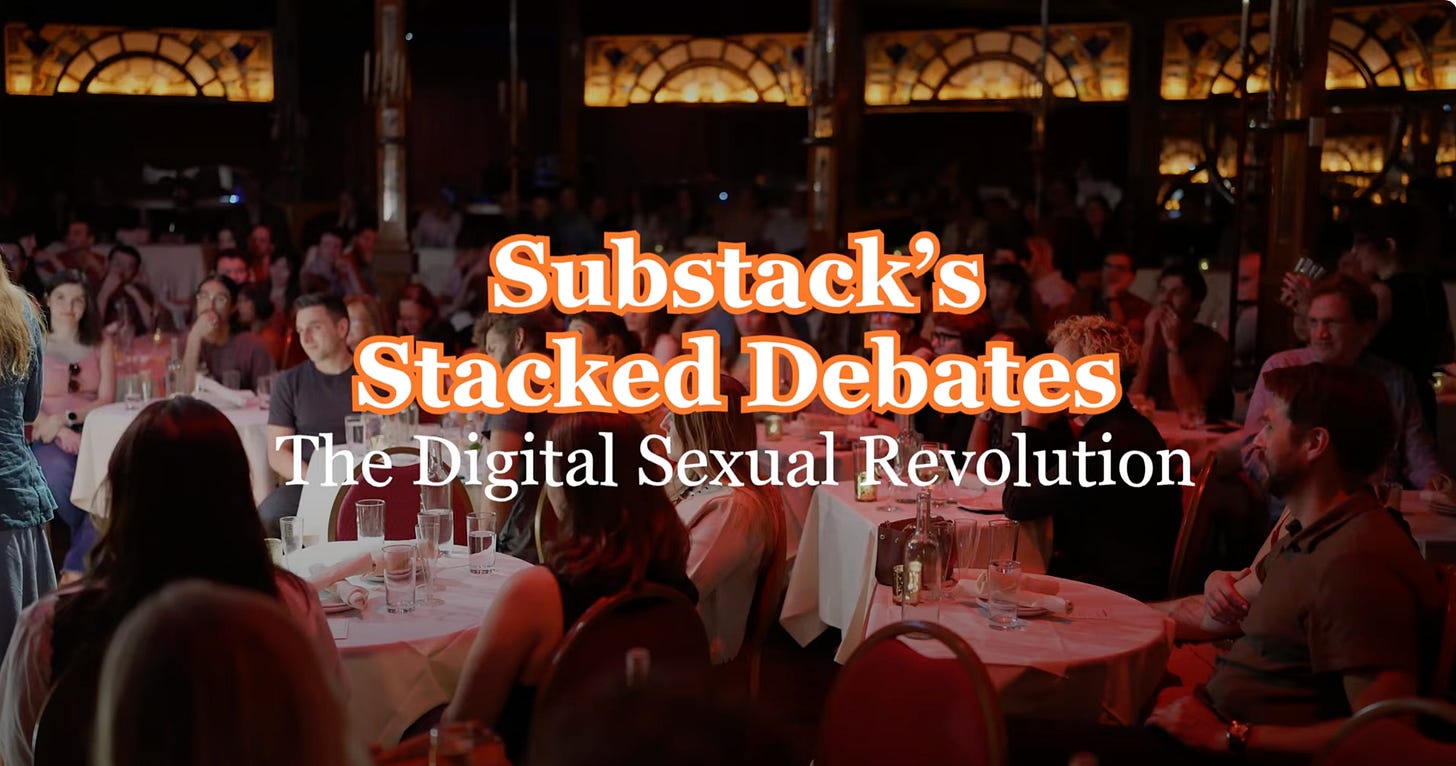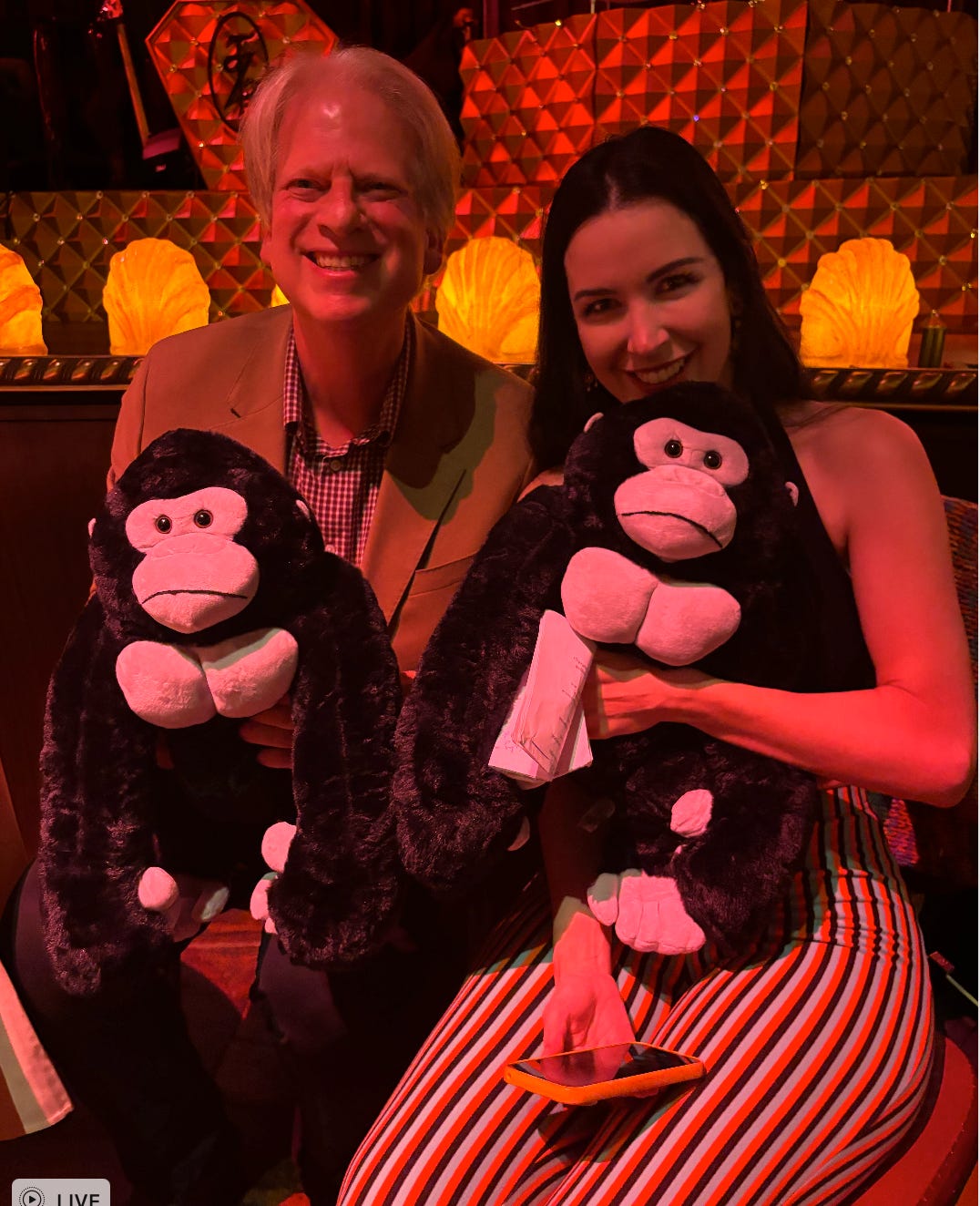Has sexual desire been reprogrammed by the internet?
My opening statement at the Substack sex debate
A couple of weeks ago, I went to Chicago to participate in a series of debates sponsored by Substack. It was a hugely enjoyable event. I’m grateful to Matt Starr, Sophia Efthimiatou, and Kylea Rosen for inviting me and being such excellent hosts, and to Katherine Dee for serving as MC.
There were three debates.
—“Will AI take over the porn industry?” with Noelle Perdue and Sean Monahan.
—“Is it cheating if your illicit affair is with AI?” with Kat Rosenfield and Kate Lindsay.
—“Is social media reprogramming sexual desires, or are they innate?”, with Blassie and Katherine Dee on the “reprogramming” side and Aella and me on the “innate” side.
I was lucky to have Aella as a debate partner—she was sharp, funny, and profane, and deeply knowledgeable about the scientific literature on desire. And her uninhibited vibe was a nice counterpart to my more buttoned-down Canadian demeanour.
If you have questions about the debate—or anything else I’ve written on Substack, or anything else at all—I’ll be hosting a Zoom meeting with my paid subscribers on Saturday, October 4, at 10 AM EST. I’ll send out the Zoom link to these subscribers in a couple of days, so if you’re tempted to go paid, now is a good time to do so!
You can watch the debates (ours is at the end, at the 52-minute mark) in the video at the bottom of this post. But if you have a fetish for reading, here is the text of my opening statement.
—
There has been a lot of excitement over social media about this debate and all the tremendously cool people on stage, but one question persistently came up: What’s Paul Bloom doing there? Someone on Twitter called me a diversity hire. And, yes, but as a diversity hire, I can bring something different to the mix—some experience:
I’m old enough to remember when there was a panic over gay school teachers. The people who were panicking would say they have nothing against the gays, but they worried that they would turn their kids gay. They believed in the malleability of sexual desire, and, consistent with this, they also believed in conversion therapy—with the proper techniques, you can shift people’s desires and orientations back and forth.
I think you know how this ended—the gay teachers were allowed to teach, it had no effect at all, and by the way, conversion therapy doesn’t work either. Sexual desire isn’t as plastic as people think it is.
Now you might think that the internet is a different story — that it has had a transformative effect on our desires. Aella and I are here to argue that it didn’t. To set this up, we’ll do that annoying debate thing where we clearly define exactly what we’re arguing about. We’re not talking here about behavior, and we’re not talking about self-identification. We agree that both of these have changed a lot over recent years.
Just as one example, the share of Americans who identify as LGBTQ+ increased by 60-80 percent from 2012 through 2020. This jump is almost entirely due to shifts in women—most of all, liberal women, highly educated women, and women under 35—identifying as bisexual.
Now that’s a big effect. And maybe it’s caused by the internet. But surveys also find that over 90% of women who call themselves bisexual are currently in a relationship with a man, and most women who are bisexual have only had male sexual partners in the last five years.
I don’t want to trivialize the importance of this shift in self-identification. But it’s not a shift in romantic and sexual preference.
What if we get more fine-grained? Has there been a shift in the kinds of bodies we are attracted to? There have been studies, almost all of them targeted at heterosexual men, that look at the women who these men find attractive, such as Playboy models, Miss America winners, and the like.
There have been changes over the last few decades. These women, on average, have gotten thinner. But they continue to fit the same template: they are young, with symmetrical faces, unblemished skin, clear eyes, and a certain waist-hip ratio—the standard cues to fertility and health.
There has been much less research on the male bodies that straight women like to look at, but several commentators have observed that we’ve moved to more of a muscle culture. The first James Bond, Sean Connery, appears positively pudgy in comparison to the most recent one, Daniel Craig. But while straight women prefer somewhat older partners than straight men do, the fundamentals are the same—once again, symmetry, clear eyes, good skin, and so on.
This is true more generally. I wish we had a slide show. You’ll see that extremely sexy actors from the past look a lot like extremely sexy actors from the present. If you like Sydney Sweeney, you’re gonna like Marilyn Monroe. Cary Grant, Rock Hudson, Denzel Washington, and George Clooney are basically the same guy—a lot more similar than they are different.
If you look more exclusively at porn stars, you’ll see some differences over time—some male stars in the 80s had these terrific moustaches, and women didn’t tend to have as many tattoos. But again, they all look the same as the popular ones today. (If you have the chance, open the web browser on your phone and have a look.)
Now, if I were on the other side of this debate, I’d make a big deal about porn search terms. And this does seem like a problem for anyone arguing that sexual desire is hardwired and evolved. How do you explain why hunter-gatherers would have a strong desire to watch sexual scenes involving stepsisters, real estate agents, and Mormons?
So I’ll say three things about this, and then Aella will say a lot more.
The first is that the majority of search terms are just what you would expect—female body parts and popular sex acts.
The second is that an innate drive can manifest itself in different ways in different cultures. Big Macs and hot fudge sundaes are modern inventions, but they resonate with evolved desires for food—namely, a love of fat and sugar. Similarly, it’s exciting for men to imagine sexual opportunities with women in their environment, and taboo spices it up. Porn works within that space of desire. So about ten years ago, “secretary” was a popular search term; now it’s “stepsister”. But it’s the same message, just a different font.
And third, there’s some effect of novelty. A friend of mine told me she stumbled onto the porn search history of her young teenage son, and it was all “naked”, “boobs”, “pretty naked woman”, and “sexy naked”. I bet that over the next year or so, this will become a bit less boring, and the search terms will become more specific and a bit more weird. And, to concede a point to the other side, this is a case where sexual desires do get reconfigured a bit.
But I think they’re reconfigured for porn, not the real world. When my friend’s son is with an actual naked person for the first time, I bet he won’t be bored at all. His desires will be much the same as those of every other young man or young woman throughout history. Some of these desires are universal; sometimes they vary from person to person, but they are part of our nature and have little to do with what we see on the internet.
Oh, and by the way, the audience voted at the end. Winners were determined by applause to the question of how much each side changed their minds. We won! Here are Aella and I with our prizes—gorillas!




Intimacy has become shallow, driven by apps and the fear of loneliness. We use bodies rather than connect with people, leading to empty encounters.
We perform our lives online for validation, curating profiles to the point that we lose touch with our true selves. This performance is exhausting and ultimately unfulfilling.
Life, especially in micro cosmos, can be suffocating. People feel judged and unseen, leading to quiet despair and a feeling that personal unhappiness is their own fault.
Many people are too afraid of being hurt to express their true feelings, resulting in unspoken words, missed connections, and a deep-seated emotional fatigue.
Our political and social systems often feel like a show, offering the illusion of choice while discouraging real dissent. Justice becomes more of a slogan than a reality.
We look to AI to solve our problems, but without careful, ethical programming, it will only reflect and amplify human flaws like greed and bias.
True goodness isn't found in grand gestures, but in small, everyday decisions: being honest, listening, and continuing to try even when no one is watching.
If you believe that people's sexual preferences, fantasies, and behaviors have not been shaped by porn, then I'd love to hear your answers to these questions:
1. Imagine an alternative timeline for humanity in which the internet and porn are never created. Do you believe people would have the same preferences, fantasies, and behaviors?
2. Porn popularizes and normalizes certain acts, some that are dangerous, risky, or extreme, such as strangulation during sex or bondage. Do you believe that women in remote tribes have the same fantasy to dress up in a leather suit, to be tied down by a man, call him "daddy", and have him strangle her until she's about to faint? If preferences are innate and the internet does not change or create them, we should see the same percentage of women choosing this, right?